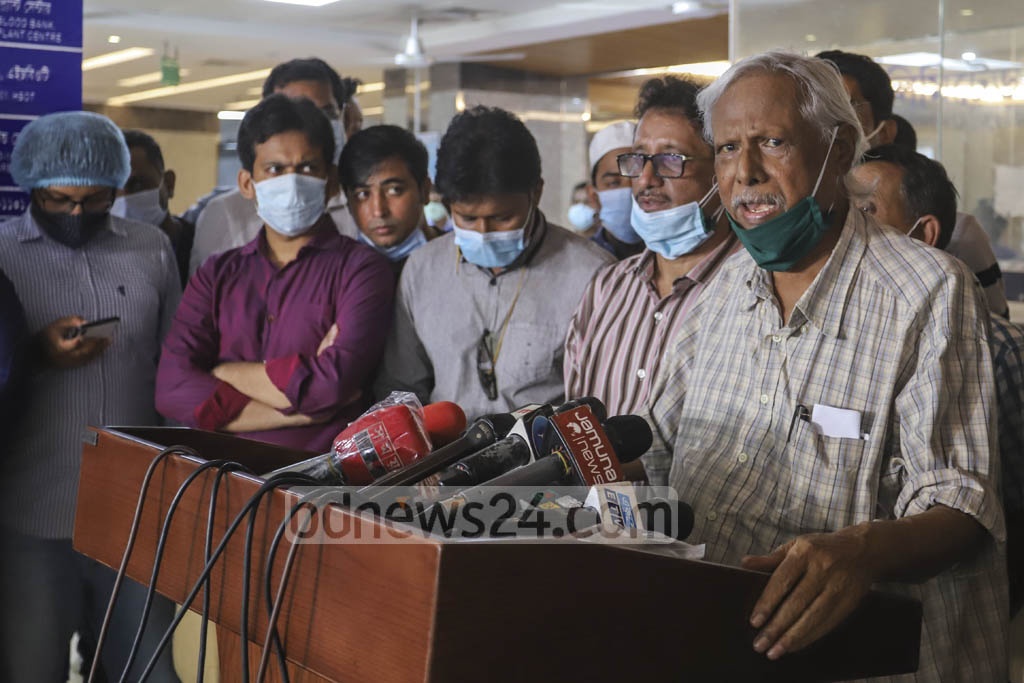Home
+
The freedom fighter and public health activist was suffering from kidney complications for a long time

Published : 12 Apr 2023, 12:06 AM
Dr Zafrullah Chowdhury, the founder of Gonoshasthaya Kendra, has died at a hospital of the organisation in Dhaka at the age of 82.
Prof Brig Gen Mamun Mostafi, the chief of the Nephrology Department at Gonoshasthaya Nagar Hospital, said Dr Zafrullah passed away around 11pm on Tuesday.
The Gonoshasthaya Kendra also announced the death of the freedom fighter on Facebook.
He had been suffering from kidney complications for a long time. After catching COVID-19 in 2020, he developed liver problems. Doctors said he had also been suffering from malnutrition and septicaemia, or blood poisoning by bacteria.
Dr Zafrullah, the winner of the highest civilian honour Independence Award, recovered from COVID-19 after he had taken convalescent plasma therapy and kidney dialysis at home but later moved to the Gonoshasthaya Nagar Hospital for more dialysis and oxygen support.
He was hospitalised again a week ago after his health deteriorated. A medical panel of specialists was formed to oversee his treatment on Sunday.
He was put on life support on Monday after his health deteriorated further.
Prof Mostafi, who was overseeing Dr Zafrullah’s treatment, said the doctors started his kidney dialysis on Tuesday afternoon and his body was responding to medications for infection of blood.

Born at Raozan in Chattogram on Dec 27, 1941, Zafrullah passed intermediate from Dhaka College after matriculation from Nabakumar School in Bakshibazar. After doing his MBBS from Dhaka Medical College in 1964, he travelled to the UK to pursue higher studies.
As the war started in 1971, Zafrullah along with Dr MA Mobin and some other Bangladeshis burnt their Pakistani passports at Hyde Park in London during a protest against Pakistan.
Zafrullah and Mobin then collected Indian travel permits and boarded a plane to Delhi just a week before their final exams, abandoning their hope of getting the degree for which they studied for four years,
Late Jahanara Imam, widely revered as 'Shaheed Janani’ (Martyr's mother) who started the movement for war crimes trials in the 1990s, described in her autobiography ‘Ekattorer Dinguli’ how Zafrullah and Mobin tricked a Pakistani colonel in Damascus to evade arrest.
They reached the battlefield in Bangladesh via India. Zafrullah took guerrilla training at Melaghar in Agartala where he founded a field hospital to treat injured freedom fighters.

After independence, he built a health centre in Dhaka’s Eskaton and relocated it to Savar with an aim to make rural Bangladesh the centre of development and other activities. Half of the workers of the centre, named Gonoshasthaya Kendra, were women as part of the organisation’s efforts to ensure women’s empowerment.
Dr Zafrullah became a member of the national committees on education and women in 1979. He played a role in making Bangladesh’s National Drug Policy in 1982.
During the COVID-19 pandemic, Dr Zafrullah helped Bangladesh tackle the situation. Gonoshasthaya Pharmaceuticals took an initiative to mass produce a coronavirus testing kit, but the attempt failed.
He won the Independence Award in 1977 and the Ramon Magsaysay Award, known as the Nobel award of Asia, in 1985.
The Ramon Magsaysay Award Foundation said it recognised his engineering of Bangladesh's new drug policy, eliminating unnecessary pharmaceuticals, and making comprehensive medical care more available to ordinary citizens.
The University of California, Berkeley honoured him with the International Health Hero award in 2002.
Zafrullah was not directly involved with any political party, but was known as a critic of the Awami League government.
Before the 2018 general election, he played a role in bringing the Awami League’s political opponents under the banner of the BNP-led Jatiya Oikya Front.